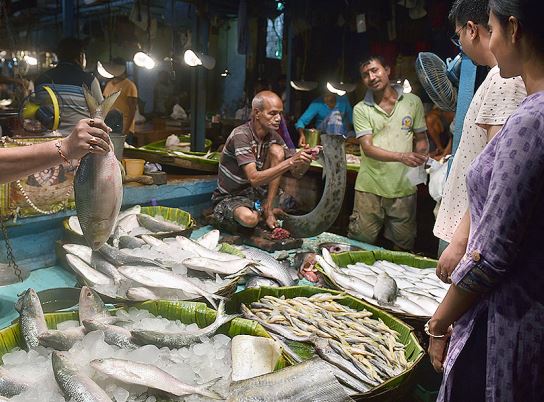Fishy affair
Sir — A crowded fish market was a sight that was once synonymous with Calcutta. Vendors perched atop raised platforms haggled with eagle-eyed customers even as they sliced different varieties of fish — ilish, rui, katla, bhetki — with a sharp bonti under incandescent bulbs. Customers jostled for space as they poured over the piscine wares on display to gauge the freshness of the fish with their bare hands while debating everything — from marine life to politics. The chaos of the fish market was an experience to be cherished each morning. In fact, these markets were places where all differences — caste, class and gender — dissolved. But with the advent of mobile apps that deliver fresh fish to our homes, the charming ecosystem of the fish market is fast disappearing.
Roopsha Bhadra, Calcutta
New dynamics
Sir — The historic Abraham Accords, signed by Israel, the United States of America and the United Arab Emirates in 2020, was the first hint of normalisation of Arab-Israeli relations in 26 years. It significantly altered the equations in West Asia, an outcome of which is the unprecedented alliance, I2U2, comprising countries like India, Israel, the US and the UAE (“Missing glue”, July 18). In its recently-held summit, I2U2 tried to address several pressing concerns. The UAE has pledged $2 billion to develop integrated food parks across India while the US, UAE and Israel committed to jointly invest in a solar and wind energy project in Gujarat. Of late, India has taken a nimble approach to foreign policy, keeping in mind the emerging global trends and potential threats to its interests. The I2U2, which is being hailed as the ‘West Asian Quad’, is expected to counter China. However, given the fraught relations in the region in the past, it remains to be seen how the grouping lives up to the challenges before it.
Vijay Singh Adhikari, Nainital
Corrupt practice
Sir — The prime minister, Narendra Modi, recently cautioned the youth of the country against accepting freebies handed out by politicians in exchange for votes and urged for the eradication of the culture of bribery (“Bittersweet”, July 20). Politicians across the spectrum brazenly attempt to win the favour of the electorate by offering doles. In fact, governments helmed by the Bharatiya Janata Party — both at the Centre and in the states — have only perpetuated the practice. Modi should look within his own party before pointing fingers at others. The culture of giving and receiving bribes affects several aspects of public life, such as recruitment and school admissions. It thrives owing to public ignorance and a lack of political awareness. Steps should be taken to make people aware of such malpractices and help them differentiate between welfare measures and freebies.
Kiran Agarwal, Calcutta
Sir — The prime minister has expressed concerns about the political culture of doling out freebies in India. But every political party is complicit in it. Such doles end up hurting the economy. This is evident in the economic downturn in Sri Lanka — a disproportionate amount of freebies had an adverse impact on the island nation’s fiscal health. It is the constitutional responsibility of governments to cater to the needs of the deprived sections but they must not misuse the opportunity for electoral dividends.
Yash Pal Ralhan, Jalandhar
On sale
Sir — The Central government is reportedly set to introduce the bank sale bill in the ongoing monsoon session of Parliament. The bill will facilitate privatisation of public sector banks. This is disconcerting. Efforts must be made to equip and revive the failing banks instead of selling them to private buyers. Several PSBs had reported a significant rise in non-performing assets over the last few years. This is one of the causes of bank failures. But there has also been a sign of recovery. Most public sector banks reported an increase in their profits in the last financial year. The Centre must do whatever it takes to keep up this positive momentum instead of privatising banks.
Monika Patidar, Ujjain
Sir — The government’s intention to introduce a bank sale bill is in line with its privatisation spree of crucial government assets. Privatisation of public sector banks will be a huge mistake. The government must rethink its decision.
Sushant Sharma, Gaziabad
August role
Sir — Draupadi Murmu — her election is a foregone conclusion given the strength of the National Democratic Alliance in Parliament — will be the first tribal person to occupy the office of the president of India. Yet, her elevation to this august chair seems like an act of tokenism as atrocities against adivasis and the lower castes continue to be perpetrated with impunity under the current dispensation. The president only functions as a figurehead and has little say in crucial decision-making processes. However, the post of the president vests moral authority in the person who holds office. Murmu should perform her moral duty to the republic by counselling the government to take the right path.
G. David Milton, Maruthancode, Tamil Nadu
The great eye
Sir — The stunning images of objects located millions of light years away that were captured by Nasa’s James Webb Space Telescope made even laypersons ponder the mysteries shrouding the universe. This telescope is the largest-ever space-based telescope launched by Nasa in collaboration with the European Space Agency and the Canadian Space Agency. The images taken by it contain more than 150 million pixels and are constructed from about 1,000 image files. The telescope can see all the way back to the creation of the universe.
M. Jeyaram, Sholavandan, Tamil Nadu










